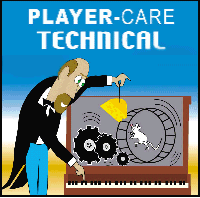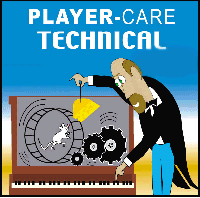
|

|

|

|

|

|
| Home | Manuals | Supplies | Search | Consult | Contact | Testing | Service |


|
|
SPECIAL NOTE: The following information relates specifically to the moving parts in the spoolbox and transmission of an ordinary 88-note player piano. A recent posting in the Mechanical Music Digest concerning lubricants for the metal parts in player pianos caused a number of people to offer their opinions. Within a week, it became realtively clear that there was very little 'hard' data on the topic. Typically, those who engaged in the conversation provided information about either their own personal experiences or the opinions of those in related fields, such as music boxes and clocks. While these opinions had some value, they didn't get to the heart of the matter, i.e., what constitutes a good lubricant? Regarding lubricants for metal-to-metal parts in player pianos, a number of the original player piano service manuals recommend 'a light oil', 'tallow', or 'grease'. However, most of these manuals were written 90-110 years ago and 'time' has proven that such lubricants eventually become problematic. Service manuals written for modern player pianos made between the late 1950's and the 1980's, recommend "oil" or "vaseline". Apparently, the problem with all of these lubricants is that sooner or later they will dry up and become 'gummy'. After exchanging a number of emails with a couple of people who were willing to look deeper into the matter, Craig Brougher wrote the following:
|

|
Since "Player-Care" is an internet business, I prefer that we correspond via E-Mail (click here to fill out the 'Request Form'). However, if I'm not in the middle of some other activity, you can reach me at 732-840-8787. But please understand that during the hours from 8AM-5PM EST (Mon-Sat), I'm generally quite busy. So, I probably won't answer the phone. If you get the answering machine, please leave a detailed message stating the reason for your call. Also, repeat your name and phone number clearly and distinctly. By necessity, I prioritize everything in my life. And, if you call and just leave your name and number, and ask me to call you back, it might be a day or two before I return your call. Why? Because I don't know why you want me to call and I might not be prepared to assist you in an effective and efficient manner. If you leave me an E-Mail address (which I prefer), spell it out phonetically. The more you do to help me, the more I can help you in return. Don't rush. You have four minutes to record your message. |
|
407 19th Ave, Brick, NJ, 08724 Phone Number 732-840-8787 (Voicemail Only, No Texts) |
